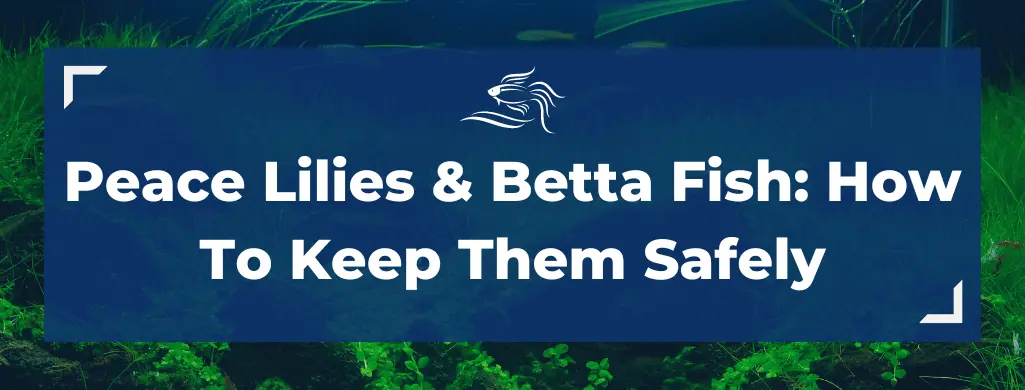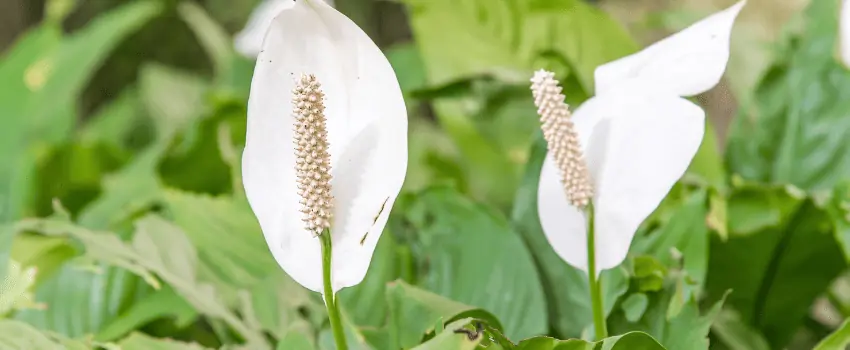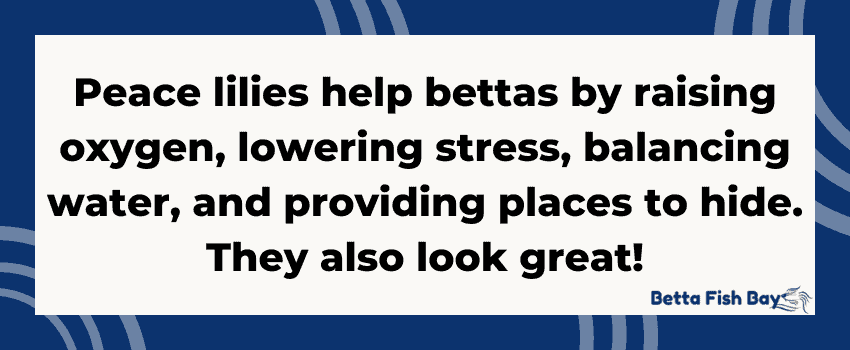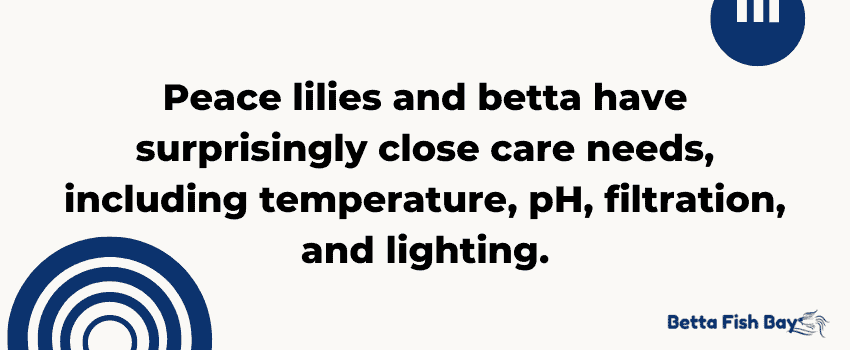Betta fish are one of the most popular aquarium pets in the U.S. People love them for their ease of care, gorgeous colors, and impressive finnage.
If you plan on getting a betta, you’ll want to ensure its tank has plants.
Bettas like plants for hiding, and the plants also oxygenate the water. Also, plants can improve a tank’s aesthetic or create a brand-new one.
Peace lilies may be known as land plants, but they can thrive underwater.
Peace lilies are a good fit with betta fish, as long as your fish is well-fed as these plants are toxic if eaten. These gorgeous plants are a great mid-ground or background addition. They will add a sense of elegance and exoticism to your betta’s tank.

Table of Contents
Betta Fish and Peace Lilies
As mentioned, betta fish and peace lilies can live together in a tank. Before diving into care needs, let’s look at the two species in question.
Betta Fish Overview
Bettas are tropical fish originating from Southeast Asia. They’re found in the waters of Thailand, Malaysia, Indonesia, and other nearby countries.
These beautiful fish come in all kinds of colors, patterns, tail types, and more. Aquarists love them for their vibrant colors and attractive finnage.
The most successful betta keepers provide a tank setup similar to the betta’s native habitat. This means warm water temperatures, low levels of water movement, and plenty of plants.
Peace Lily Overview
Peace lilies are simple yet elegant plants commonly used in aquariums. They can thrive in aquatic environments, but you’ll need to sometimes give them time outside the water.
Peace lilies’ water and lighting needs are similar to those of betta fish. Peace lilies are used to tropical environments, meaning they tend to do well in betta tanks.

Can they be kept together?
In most cases, betta fish and peace lilies can live in the same tank. They have similar care needs, and both prefer tropical environments.
Keep in mind: bettas are omnivorous fish.
This means they eat both plant matter and animal matter. If you underfeed your betta, it might begin eating the peace lily’s leaves.
Peace lily is toxic to betta fish if ingested. Most of the time, well-fed bettas will not eat the leaves.
To keep your betta healthy and away from the peace lily leaves, feed it a proper diet.
Bettas need a diet high in protein and fiber. Also, it’s best to feed your betta a variety of different types (such as live, frozen, and pellets/flakes).
Otherwise, there should be no issues introducing a peace lily to your betta tank.
Benefits of Keeping Peace Lily Plants with Betta Fish

Aquatic plants, such as peace lilies, offer numerous benefits to fish. Here are just a few reasons to consider adding a peace lily to your tank.
Improved Water Quality
Adding a peace lily to your tank can improve the water quality.
When planted in an aquarium, peace lilies consume nutrients algae would otherwise consume. In doing this, the peace lily prevents the overgrowth of algae.
This is important because excess algae growth reduces water quality. It forms a film at the water surface, which prevents your betta from performing gas exchange.
Oxygenation and Carbon Dioxide Removal
Peace lilies help oxygenate the tank water through a process called photosynthesis.
This is where the plant takes carbon dioxide from the water and turns it into oxygen. It then releases the oxygen back into the water.
This is essential for your betta. Since bettas have a labyrinth organ, they need to get some oxygen from the water.
Planting a peace lily in your tank will keep your betta from needing to swim to the water surface as often.
Reduced Stress for Betta Fish
Keeping peace lilies with betta fish can reduce the bettas’ stress levels.
In general, bettas prefer aquariums with plenty of plants. These aquariums mimic their natural environment, helping them feel comfortable and at home.
Plants like peace lilies also provide shade and cover. Bettas, which are rather territorial, enjoy having these added hiding spots.
Aesthetic Appeal
Peace lilies are simple but attractive. Adding some to your tank is a great way to enhance its aesthetic appeal.
You may want to use peace lilies as part of a larger plant arrangement. Consider including Java moss or floating plants for a complete look.
Potential Risks of Keeping Peace Lily Plants with Betta Fish
Unfortunately, peace lily aquariums do pose some risks to betta fish. These include poisoning and decreased water quality.
Poisoning
Peace lilies contain a substance called calcium oxide. This substance is toxic and harmful to betta fish.
Sometimes, underfed bettas will dig up and eat plant roots to get the nutrients they need.
They may also eat the stems or leaves. When they eat too much calcium oxide, it makes them sick and can cause death.
These are the two best ways to keep your betta from eating the peace lilies:
- Feed your betta a balanced, high-protein diet. Eating plant roots is not normal betta behavior. In most cases, only bettas not getting enough to eat will do so. Give your betta a varied diet containing all necessary nutrients, including ample protein and fiber. This will prevent it from eating the peace lily roots.
- Avoid planting the peace lilies in your aquarium. Even if you feed your betta well, there’s a chance it will try eating the plant roots. The only sure way to keep your betta safe is to not plant the peace lilies. Consider growing them in a nearby vase or pot instead.
While poisoning is a valid concern, most bettas will leave the plant alone.
Compatibility of Betta Fish and Peace Lily Plants

Most betta keepers have no issues keeping betta fish with peace lilies.
The only major concern is peace lilies’ toxicity to bettas. It is not typical for bettas to eat aquatic plants, though, unless they’re malnourished.
Bettas and peace lilies have similar water condition needs, as outlined below.
| Water Temperature | pH Level | Level of Water Movement | Filtration | Lighting | |
|---|---|---|---|---|---|
| Betta Fish | 78-80° degrees Fahrenheit (25-27°C) | 6.5 to 7.5 | Low | Needed | 6 to 7 hours per day |
| Peace Lily | 65-85° degrees Fahrenheit (18-29°C) | 6 to 7 | Low | Not needed, but preferable | A few hours per day via grow lights or indirect sunlight |
Water Parameters
Bettas and peace lilies can thrive within the same water parameters.
Both originate from tropical environments, so they enjoy warm water and a more neutral pH level. They also share a preference for water with low levels of movement.
Filtration
Installing a tank filter is the best way to keep your betta healthy.
A filter pulls in the tank water, filtrates it, and releases the cleaned water back into the tank. This keeps the water free from contamination, so your bettas stay healthy.
Peace lilies do not need a filter when planted in aquariums. But having a low-flow filter will not have a negative impact on its health.
Lighting
To help your bettas and peace lilies thrive, give them low to moderate lighting for a few hours a day.
Bettas benefit from lighting in how it regulates their sleep-wake cycle. This is important because bettas become stressed and aggressive when they aren’t sleeping well.
Peace lilies benefit from lighting because it helps with their natural photosynthesis. This allows them to stay healthy and oxygenate the water.
Note: Peace lilies should never sit in direct sunlight. If using the sun for lighting, only put the lilies in partial sunlight.
Choosing the Right Plants for Your Betta Fish Tank
Peace lilies make a wonderful addition to most betta fish tanks. But they do carry potential health risks not all betta keepers want to deal with.
If you want to improve your tank with plants, there are plenty of other options. Numerous aquatic plants are safe for bettas and look amazing, too.
Here are just a few options to consider:
- Amazon Frogbit
- Amazon Sword
- Anacharis
- Anubias
- Duckweed
- Java fern
- Java moss
For more inspiration, visit our lists of the best floating plants and flowering plants for betta tanks.
Importance of Choosing a Healthy Plant

It’s important to choose only healthy plants for your aquarium.
Sick or malnourished lilies may die soon after planting. Those with diseases or parasites may pass those issues on to your betta.
Healthy peace lilies have green, glossy leaves. They also have white-and-yellow flowers.
Avoid buying a peace lily with brown, yellow, or transparent leaves.
These will not last very long and may be diseased. Also, avoid lilies that are drooping or obviously infested with parasites.
We also recommend quarantining the peace lilies before putting them with your betta. Consider treating the plant for parasites, fungus, and other health hazards.
Tips for Keeping Peace Lily Plants With Betta Fish
There are a few things to know before planting a peace lily in your betta’s aquarium.
Placement
Placement is an important aspect to consider when adding aquarium plants.
Many betta fish keepers who use this plant place it in the background or mid-ground.
This is because peace lilies grow to be rather tall. This placement enhances the aesthetic and keeps everything in the tank visible from the front.
Peace Lily Care
Peace lilies are not too difficult to take care of. The primary things to consider include the following:
- Nutrients
- Lighting
- Pruning and trimming
- Time out of water
This plant gets its nutrients from the tank water. A couple of such nutrients are iron and nitrogen. In most cases, peace lilies get enough of these nutrients via betta feces in the water.
In terms of lighting, peace lilies do best in indirect sunlight.
They also thrive when grow lights are used. Give your peace lily several hours of indirect sunlight each day for the best results.
Peace lilies need to be pruned and trimmed often.
Trim away any overgrowth and prune yellowing or browning leaves. Doing so helps keep the plant healthy and thriving.
Finally, it’s important to sometimes remove your peace lily from the betta tank.
Peace lilies can live in aquatic environments, but not forever. If your plant is drooping or not doing well, it may be time to replant it outside the tank for a while.
Monitoring Water Quality
Both peace lilies and betta fish need good water conditions to thrive.
The best way to maintain good water conditions is to install a tank filter.
A filter both cleans and oxygenates the water. Peace lilies and betta fish both benefit from clean, circulated water.
Also, perform frequent water changes. We recommend changing out 20% to 25% of the tank water once per week.
This will help keep the water clean without causing dramatic changes.
Consider buying aquarium test strips. These allow you to test the water for various substances at any time.
For example, it can show you how high the ammonia levels are. Test strips will help you take action sooner to avoid sick plants or bettas.
Make Your Betta Tanks “Peace-ful”
Betta fish enjoy environments with plenty of plants. Peace lilies are one great option to consider for your tank.
Bettas and peace lilies can thrive in the same types of aquatic environments. They’re both easy to care for and have minimal needs.
Ensure these needs are met to keep your betta fish and peace lilies happy:
- Good water quality
- Ideal water temperature and pH
- Adequate lighting
- Sufficient nutrients
Also, be careful not to let your betta get hungry. It may snack on the peace lily, which is toxic to bettas.


